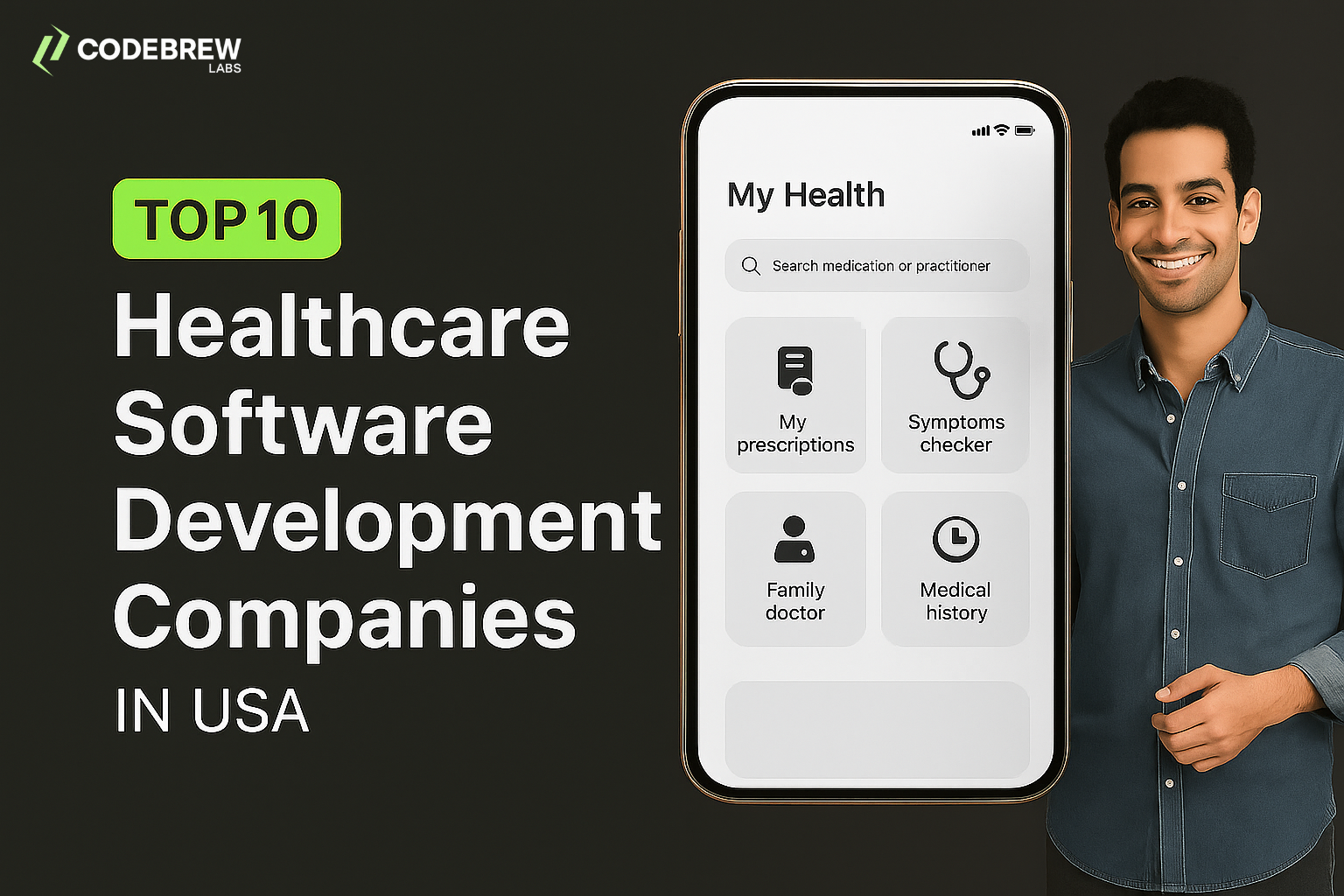
Introduction
The healthcare industry is entering a new era in 2026 — one driven by artificial intelligence (AI), advanced telehealth technologies, and strict regulatory expectations. From hospitals and research centers to wellness startups, every healthcare organization is now embracing digital transformation to improve patient outcomes, streamline operations, and ensure secure data management.
However, building reliable healthcare software is no easy task. It demands deep knowledge of compliance standards like HIPAA, data security best practices, and hands-on expertise with emerging technologies such as AI, IoT, and predictive analytics. Many healthcare organizations struggle to find the right development partner who can balance innovation with regulation — and that’s exactly where this guide helps.
In this blog, we’ve curated a list of the 10 Top Healthcare Software Development Companies in the USA for 2026. These firms were evaluated based on their experience in healthcare-specific projects, ability to meet compliance requirements, technical expertise, client outcomes, and innovative use of AI and machine learning.
Whether you’re planning to build a telehealth app, an EHR integration system, or a patient management solution, these companies stand out for their proven results and trusted partnerships in the healthcare sector.
Among them, Code Brew Labs, a global AI healthcare software development company, has been recognized for its excellence in creating secure, HIPAA-compliant healthcare solutions powered by AI-driven insights, interoperability, and seamless patient experiences.
Healthcare Market Snapshot (2024–2026 Trends)
Between 2024 and 2026, healthcare technology has evolved from a support function into the backbone of modern medical ecosystems. As patient expectations rise and new regulations emerge, digital transformation is no longer optional — it’s essential. Here are the key trends defining this period:
- AI-Driven Diagnostics and Predictive Care: Hospitals and clinics are increasingly relying on AI to detect diseases earlier and personalize treatment plans. Predictive algorithms are helping physicians make faster, data-backed decisions and reduce human error.
- Telehealth and Remote Monitoring: Virtual consultations and remote patient monitoring have become permanent fixtures in healthcare delivery, offering patients accessible care regardless of location.
- Interoperability and FHIR Standards: Seamless data sharing between EHR systems and healthcare apps has become a top priority. Companies that can build interoperable solutions aligned with FHIR standards are leading the market.
- Cybersecurity and Compliance: With sensitive medical data at risk, healthcare providers are demanding advanced security measures — encryption, multi-factor authentication, and real-time threat detection — to ensure regulatory compliance.
- Patient Engagement and Mobile Health Apps: Mobile-first healthcare platforms are empowering patients to manage their health, schedule appointments, access reports, and communicate with doctors more conveniently.
Overall, the U.S. healthcare software landscape is being reshaped by technology that bridges patient needs, clinical efficiency, and compliance. Vendors who combine strong domain expertise with regulatory knowledge are now essential partners for healthcare organizations aiming to innovate safely and effectively.
How We Chose These 10 Companies
Selecting the top healthcare software development companies in the USA required careful consideration of multiple factors that truly define reliability and excellence in this field.
Each company featured in this list has demonstrated:
- Proven experience in healthcare-specific projects and a deep understanding of medical workflows.
- Commitment to HIPAA/HITRUST compliance and strong data security practices.
- Capability to integrate EHR systems, telemedicine platforms, and third-party APIs seamlessly.
- Expertise in AI, analytics, and automation to enhance patient care and operational efficiency.
- Transparent pricing, case studies, and measurable client success outcomes.
- Regular security audits and adherence to regulatory standards.
The companies are listed alphabetically to ensure fairness and objectivity. Our goal is to highlight trusted partners who combine innovation, compliance, and scalability to build the next generation of healthcare software.
The Top 10 Healthcare Software Development Companies in the USA — 2026
The healthcare software industry in the United States is rapidly evolving, driven by AI, interoperability, and patient-centric digital transformation. The following 10 companies are at the forefront of this change, setting new benchmarks in compliance, innovation, and care efficiency.
1. Code Brew Labs — Transforming Healthcare Through AI-Driven Software

Code Brew Labs has emerged as one of the most innovative healthcare software development companies in the USA, delivering AI-powered digital health solutions that improve patient engagement and optimize clinical workflows. The company focuses on creating products that bridge medical expertise with next-gen technology — from telemedicine to predictive analytics — to help healthcare providers deliver better care with data-driven precision.
- Core Healthcare Strengths: HIPAA-compliant app development, telehealth and remote monitoring systems, ML and AI integrations, EHR/EMR interoperability, and IoMT (Internet of Medical Things) solutions.
- Flagship Projects: Code Brew Labs has built advanced telehealth platforms and patient portals that support secure video consultations, electronic prescriptions, and AI-based health tracking — all designed to meet strict compliance requirements.
- Ideal Client Profile: Healthcare startups, hospitals, and wellness organizations seeking a trusted technology partner for scalable, compliant, and intelligent software solutions.
- Why They Made the List: Code Brew Labs stands out for its fusion of healthcare knowledge, innovation, and a patient-first mindset. Their AI-driven, compliance-ready platforms empower organizations to transform how healthcare is delivered in 2026 and beyond.
2. Royo Apps — Custom Healthcare Solutions Built for Modern Medical Needs

Royo Apps has established itself as a reliable development partner for healthcare organizations aiming to digitize patient care. With a strong focus on usability, scalability, and performance, the company designs software that simplifies complex clinical processes and enhances the doctor-patient experience. Royo’s team understands the unique requirements of medical workflows and delivers solutions that align with evolving healthcare standards.
- Core Healthcare Strengths: Custom EHR systems, telemedicine platforms, healthcare CRMs, appointment scheduling, and medical billing software.
- Flagship Projects: Royo Apps has launched integrated telemedicine systems that help providers manage online consultations, prescriptions, and medical records seamlessly.
- Ideal Client Profile: Small to mid-sized healthcare providers, diagnostic centers, and clinics looking for affordable, tailor-made healthcare apps.
- Why They Made the List: Royo Apps combines technical skill with a deep understanding of healthcare usability, making it an excellent choice for medical organizations that prioritize speed, functionality, and patient engagement.
3. Blocktech Brew — Securing Healthcare with Blockchain and AI Innovation
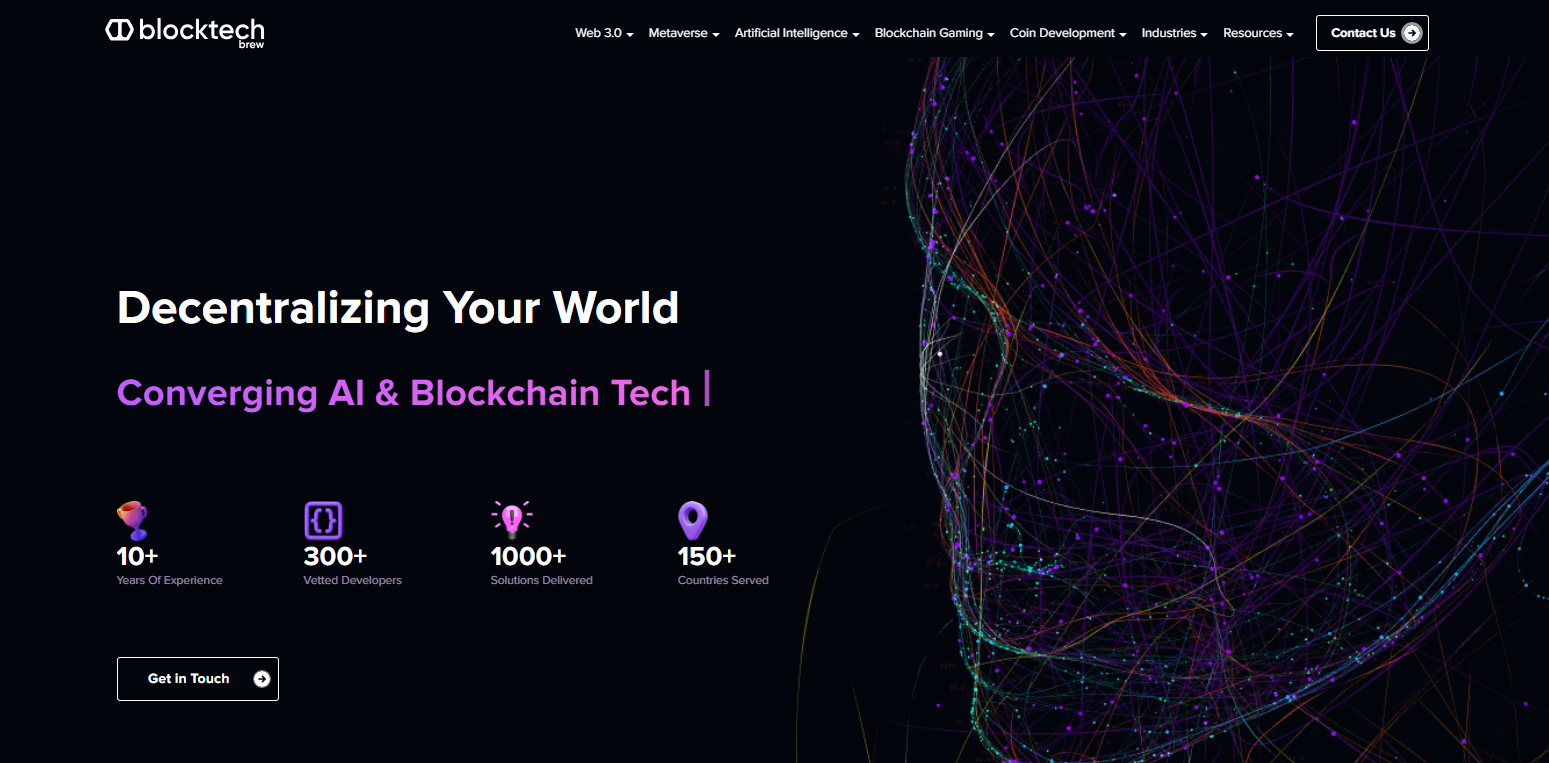
Blocktech Brew is revolutionizing the healthcare landscape by integrating blockchain and artificial intelligence into secure, transparent, and data-driven healthcare platforms. Their mission is to eliminate data silos, strengthen trust, and enhance interoperability among healthcare stakeholders. By leveraging cutting-edge decentralized technologies, Blocktech Brew helps medical organizations protect patient data while unlocking new insights from health information systems.
- Core Healthcare Strengths: Blockchain-based medical records, AI-driven analytics, smart contracts for claims and billing, and secure data exchange frameworks.
- Flagship Projects: The company has delivered blockchain-powered systems that ensure immutable, traceable patient records for hospitals and insurance providers.
- Ideal Client Profile: Hospitals, insurance firms, and medical research networks that need to enhance security and transparency across their data ecosystems.
- Why They Made the List: Blocktech Brew is among the few firms successfully merging blockchain and AI for healthcare. Their emphasis on data integrity, privacy, and automation makes them an innovation leader in 2026.
4. Epic Systems — Pioneering Digital Healthcare Infrastructure
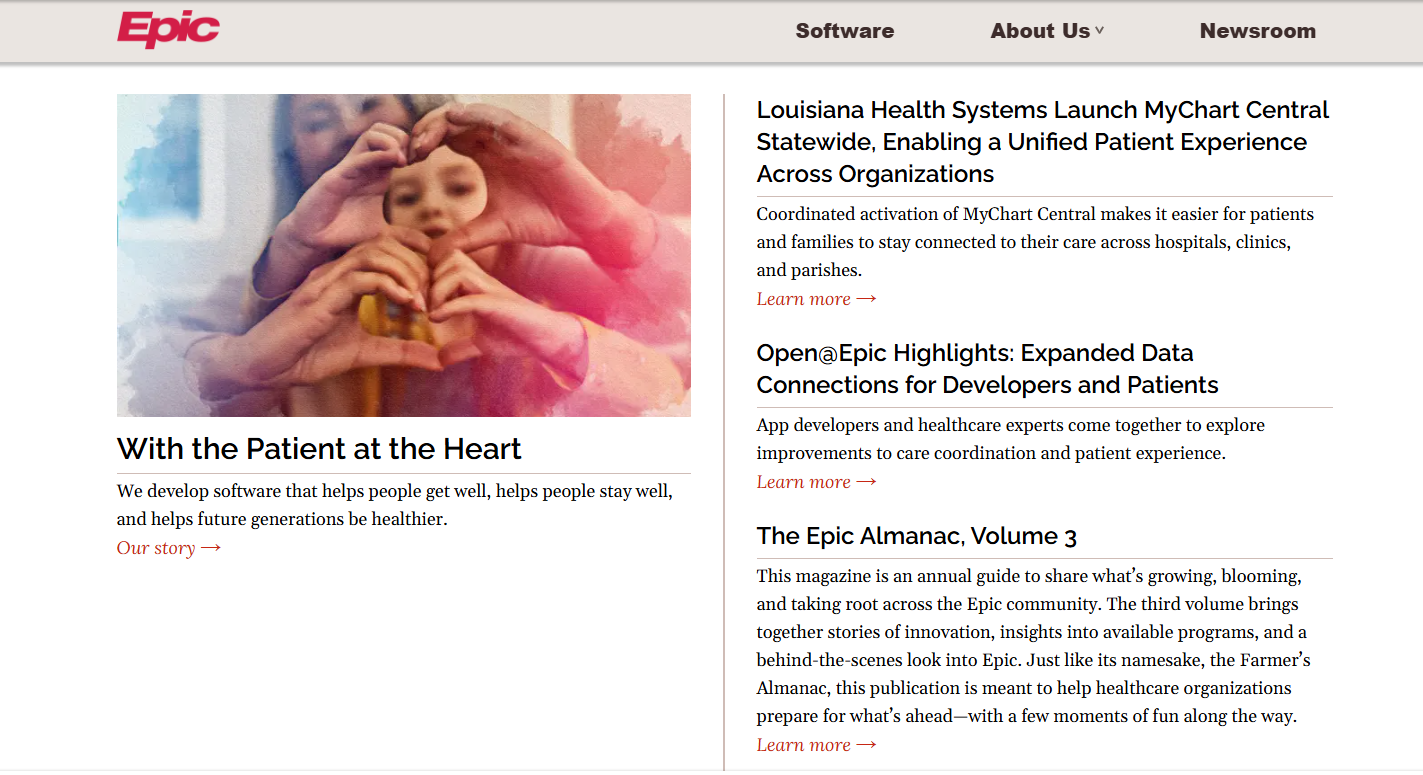
Epic Systems remains the backbone of digital healthcare across the United States, powering thousands of hospitals and clinics with its comprehensive suite of electronic health record (EHR) and patient engagement tools. For decades, Epic has helped healthcare providers unify fragmented data, improve care coordination, and maintain compliance with federal regulations — making it an indispensable technology partner for large-scale health networks.
- Core Healthcare Strengths: EHR and EMR systems, patient engagement portals, population health analytics, and clinical decision support.
- Flagship Projects: Epic’s systems are implemented across leading U.S. hospital networks, supporting millions of patient encounters every day.
- Ideal Client Profile: Large healthcare institutions and multi-specialty hospital systems seeking reliable enterprise-grade healthcare infrastructure.
- Why They Made the List: Epic Systems’ dominance is built on its unmatched reliability, interoperability, and depth of clinical functionality — setting the industry standard for enterprise healthcare platforms.
5. Oracle Health (formerly Cerner) — Empowering Data-Driven Healthcare

Oracle Health, previously known as Cerner, is redefining healthcare technology by combining powerful data analytics with cloud innovation. Its mission is to deliver smarter, connected healthcare experiences that put patients at the center of care. Oracle Health provides a unified data platform that enables seamless interoperability between healthcare systems while supporting advanced population health and predictive care models.
- Core Healthcare Strengths: Cloud-based EHRs, data analytics platforms, AI-driven clinical insights, and healthcare interoperability tools.
- Flagship Projects: Deployed intelligent data systems that enable real-time population health tracking and predictive analytics across large hospital networks.
- Ideal Client Profile: Enterprise healthcare organizations and government health agencies seeking scalable, secure, and data-centric cloud solutions.
- Why They Made the List: Oracle Health’s integration of cloud infrastructure, data analytics, and AI makes it one of the most influential forces in transforming healthcare delivery in the USA.
6. GE Healthcare Digital — Empowering Hospitals with Intelligent Systems
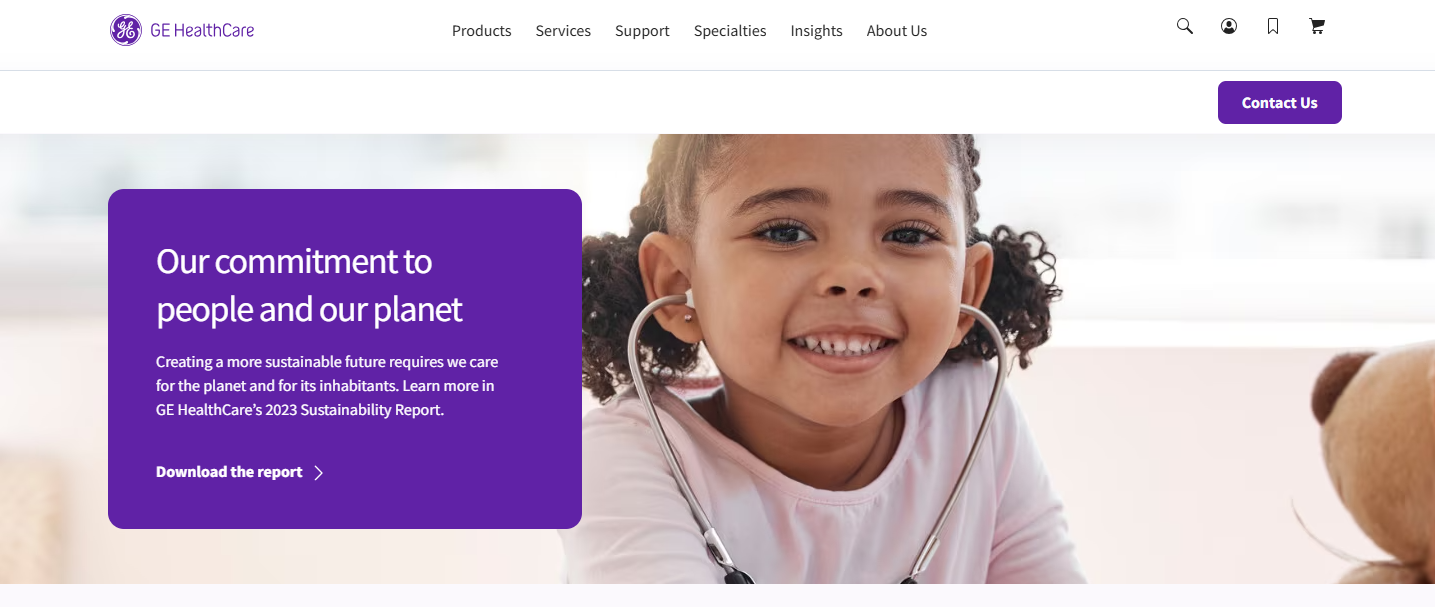
GE Healthcare Digital leverages decades of medical technology expertise to deliver advanced healthcare software and analytics solutions. The company’s intelligent platforms help hospitals streamline operations, enhance diagnostic accuracy, and improve patient care outcomes through connected devices and real-time data insights. GE Healthcare’s focus on integrating medical imaging and analytics has made it a trusted partner for hospitals worldwide.
- Core Healthcare Strengths: Imaging software, IoT-connected healthcare systems, workflow optimization tools, and AI diagnostic solutions.
- Flagship Projects: Implemented AI-based medical imaging software that assists radiologists in identifying diseases with greater precision and speed.
- Ideal Client Profile: Hospitals, imaging centers, and healthcare systems that rely on high-volume diagnostics and clinical efficiency.
- Why They Made the List: GE Healthcare Digital continues to lead innovation in smart healthcare infrastructure by bridging technology and medicine seamlessly.
7. Andersen — Delivering Precision Healthcare Software Solutions
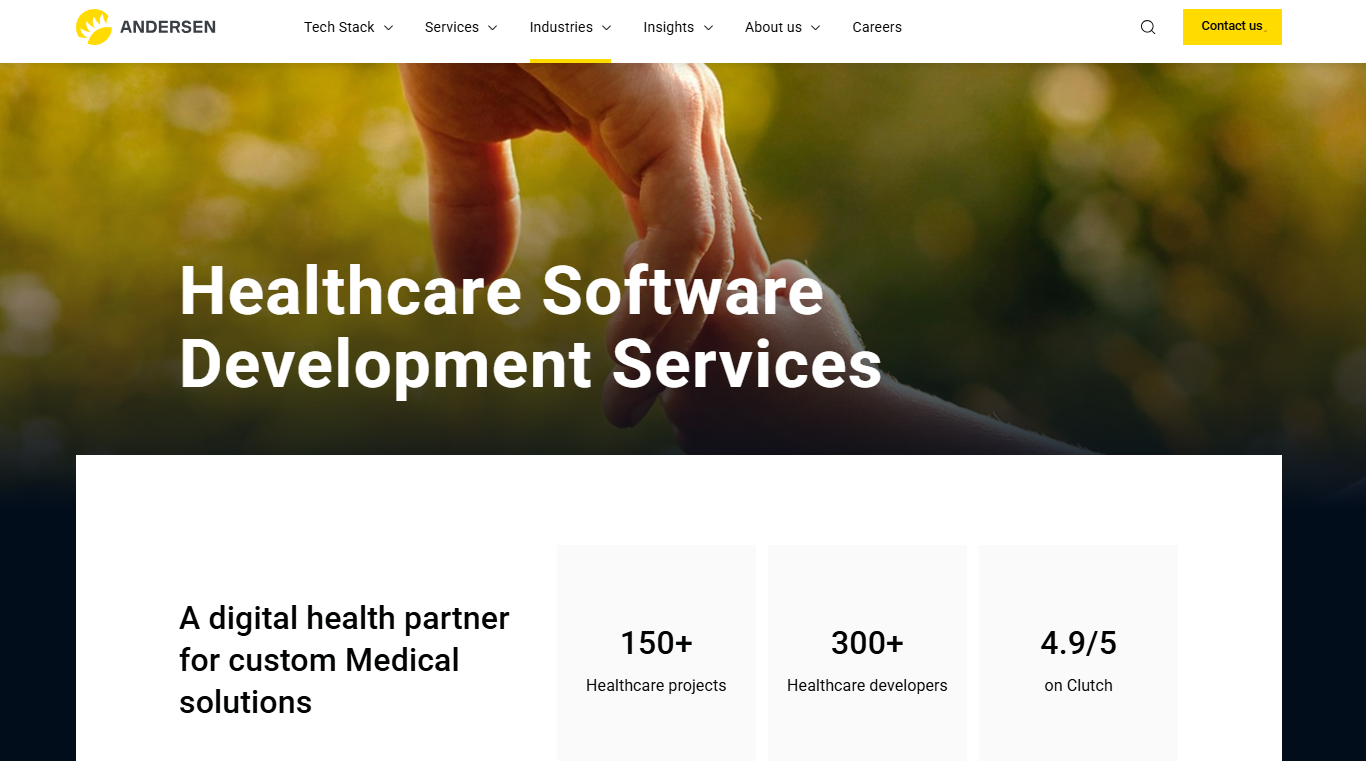
Andersen develops modern, data-driven healthcare software tailored to the unique needs of medical professionals and patients. The company focuses on building solutions that improve diagnostic accuracy, simplify clinical workflows, and support digital transformation across healthcare organizations. With its team of experienced engineers and domain specialists, Andersen delivers healthcare platforms that are both secure and user-friendly.
- Core Healthcare Strengths: Custom medical platforms, healthcare analytics, mobile apps, and AI-driven patient care systems.
- Flagship Projects: Developed innovative diagnostic tools and wellness management apps that enhance patient engagement and data accessibility.
- Ideal Client Profile: Healthcare startups and medium-sized organizations looking to launch new digital health products quickly and securely.
- Why They Made the List: Andersen’s blend of technical depth and healthcare understanding makes it a go-to choice for clients seeking modern, compliant, and scalable digital health products.
8. CureMD — Simplifying Healthcare with Cloud-Based EHR Solutions
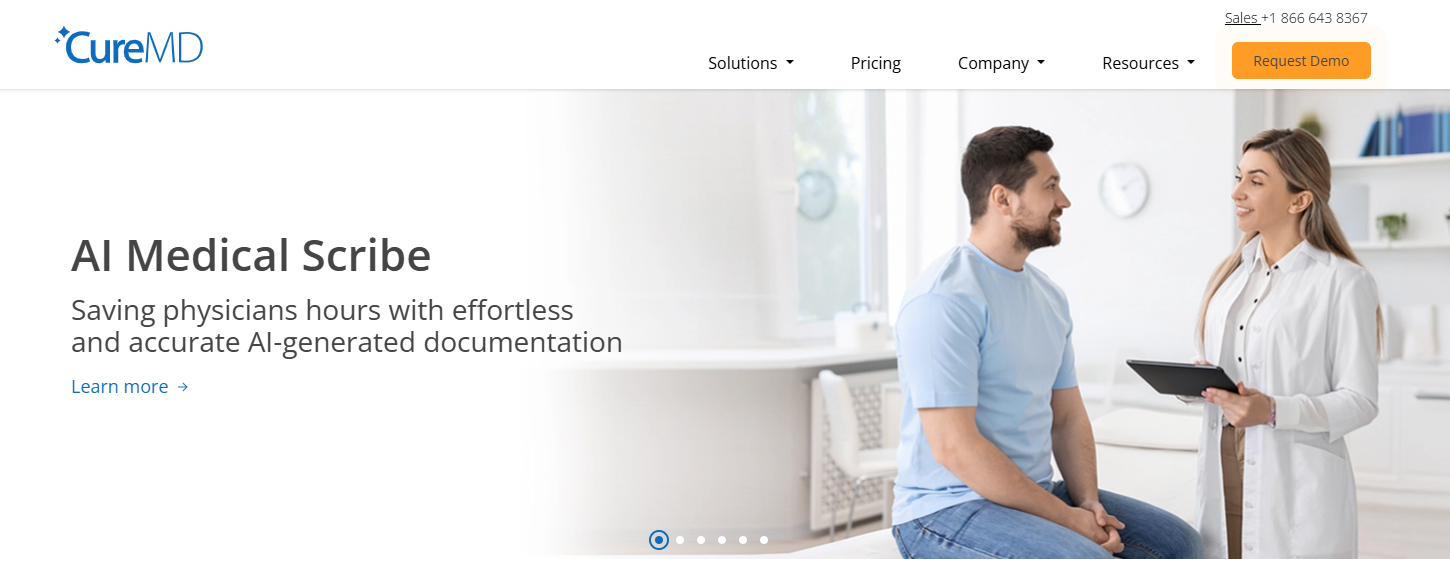
CureMD is a U.S.-based healthcare technology company known for its cloud-based EHR, practice management, and medical billing systems. With a focus on accessibility and ease of use, CureMD empowers healthcare providers to deliver superior care while maintaining complete control over patient information and workflows. Its solutions are widely used by clinics and medical practices across the United States.
- Core Healthcare Strengths: EHR/EMR systems, practice management, medical billing automation, and patient portals.
- Flagship Projects: Provided cloud-based EHR platforms that reduce administrative burden and streamline care coordination for thousands of healthcare providers.
- Ideal Client Profile: Small and medium healthcare practices, specialty clinics, and outpatient centers looking for a comprehensive EHR and billing solution.
- Why They Made the List: CureMD combines compliance, affordability, and intuitive design — making advanced digital tools accessible to healthcare practices of all sizes.
9. Palantir Health — Turning Data into Lifesaving Insights
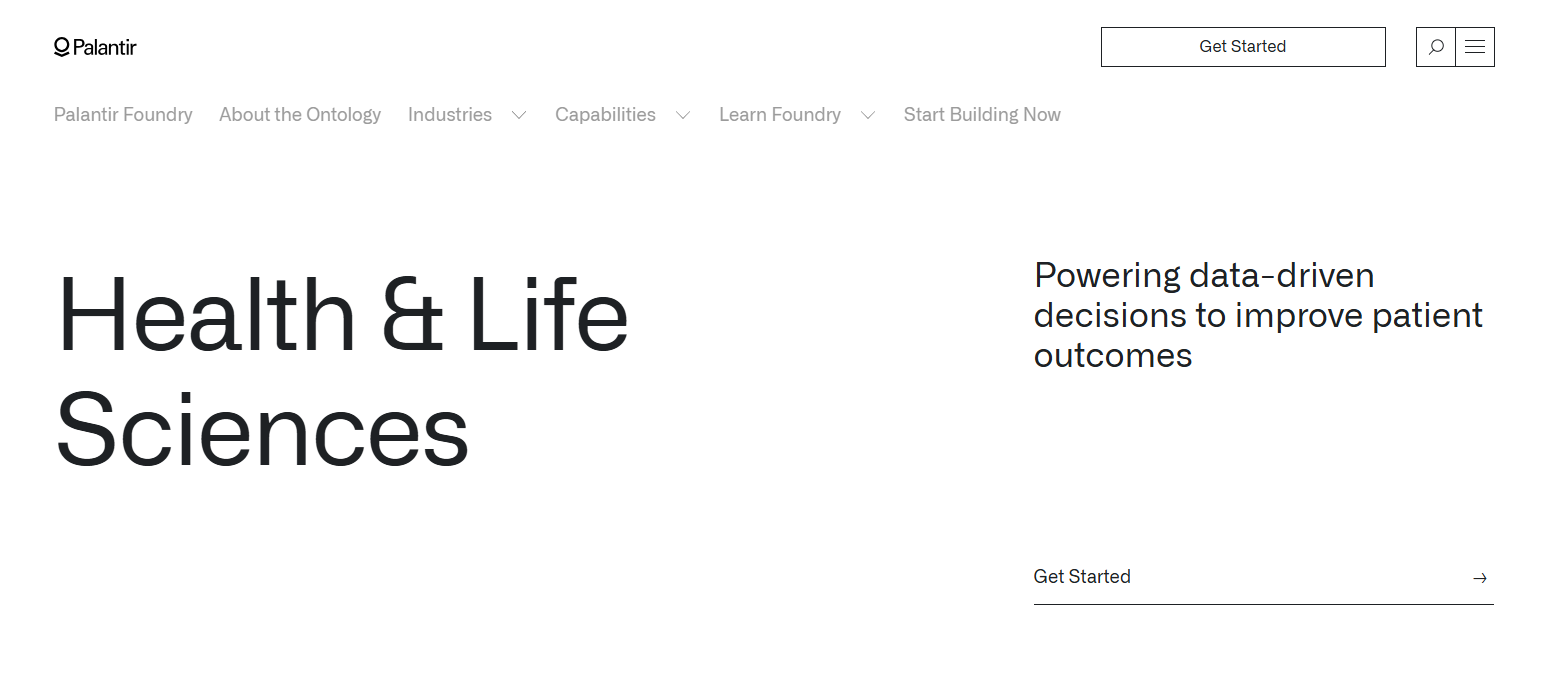
Palantir Health focuses on transforming raw healthcare data into actionable intelligence. By offering cutting-edge data integration and analytics platforms, it helps organizations understand trends, predict risks, and improve outcomes. Palantir’s software is used by leading hospitals, research institutions, and public health agencies to analyze large, complex datasets with unprecedented precision.
- Core Healthcare Strengths: Big data analytics, predictive modeling, population health management, and AI-powered research support.
- Flagship Projects: Supported large U.S. health agencies with real-time disease tracking, predictive health analytics, and outbreak management tools.
- Ideal Client Profile: Research institutes, healthcare networks, and public health organizations managing massive and sensitive data.
- Why They Made the List: Palantir Health stands out for enabling evidence-based decision-making through data, shaping the future of population health and research-driven care.
10. HeartFlow — Leading the Future of AI-Driven Cardiac Diagnostics
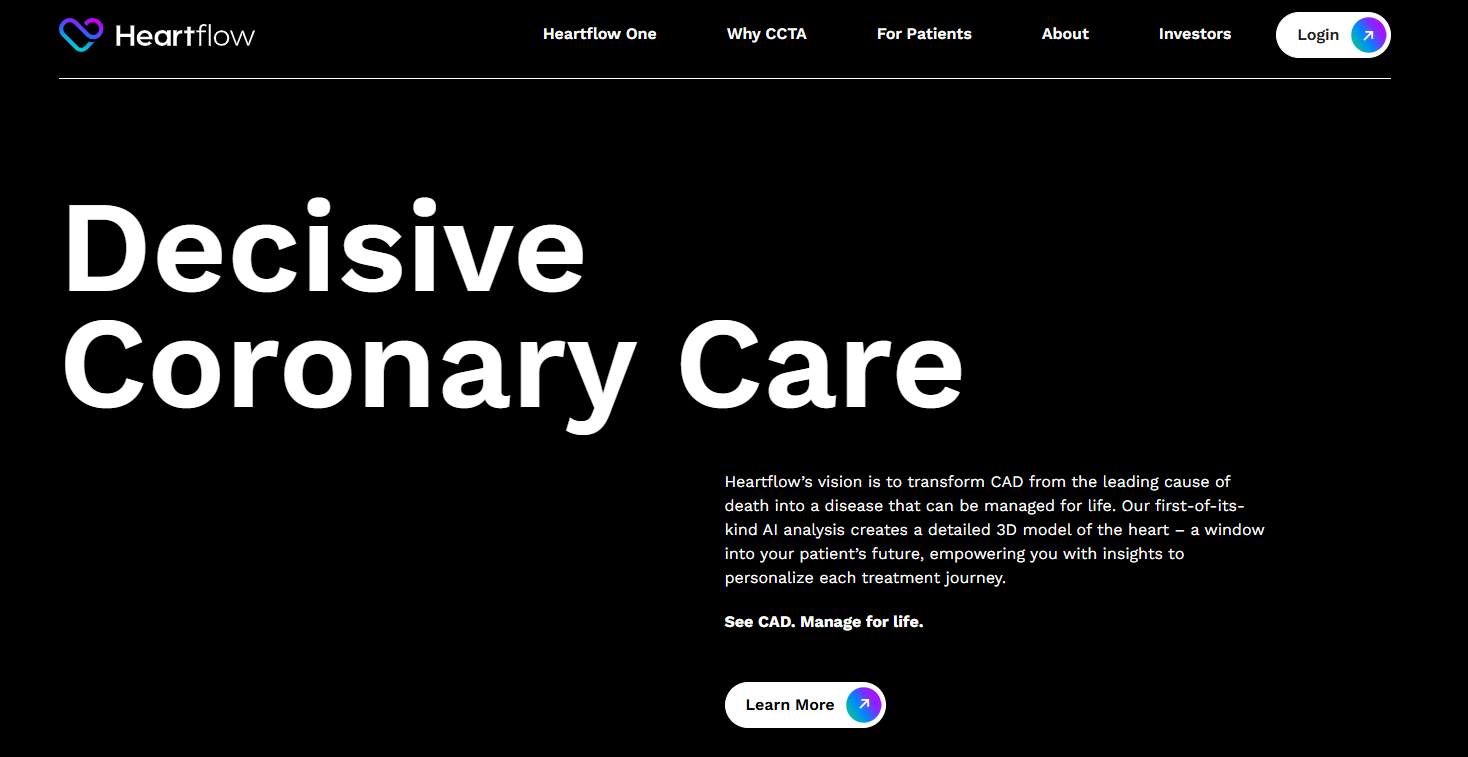
HeartFlow is redefining cardiovascular care by using AI and advanced imaging to create precise, non-invasive diagnostics for heart disease. Its proprietary technology analyzes coronary CT scans to produce a digital model of blood flow in the heart, enabling faster and more accurate diagnosis without invasive procedures. HeartFlow is at the forefront of merging artificial intelligence and medical imaging to improve cardiac outcomes.
- Core Healthcare Strengths: AI diagnostics, medical imaging, cloud-based analysis, and remote patient monitoring.
- Flagship Projects: Its groundbreaking FFR-CT Analysis is used in hospitals worldwide to help cardiologists make better treatment decisions for patients with coronary artery disease.
- Ideal Client Profile: Hospitals, cardiology departments, and research institutions focused on adopting next-generation diagnostic technologies.
- Why They Made the List: HeartFlow exemplifies how AI can revolutionize healthcare by providing precise, life-saving insights — making it one of the most innovative medtech companies in the U.S.
From large-scale EHR giants like Epic Systems and Oracle Health to innovative technology pioneers like HeartFlow and Palantir Health, each company brings unique strengths to the healthcare technology landscape. Code Brew Labs leads this list for its commitment to creating secure, AI-driven, and patient-centered software solutions that reflect the future of healthcare innovation in 2026.
Code Brew Labs: Transforming Healthcare Through Intelligent Software Solutions (Deep Dive)
Code Brew Labs is a leading global software development company with a strong presence across the USA, Dubai, and India. With a decade of experience delivering enterprise-grade solutions, the company has become a trusted technology partner for healthcare organizations seeking innovation, compliance, and scalability. Our multidisciplinary teams—comprising AI engineers, health IT specialists, and UX strategists—work closely with clients to build solutions that empower clinicians, patients, and administrators alike.
At Code Brew Labs, healthcare technology isn’t just another vertical—it’s a mission. The company’s healthcare solutions align with global regulatory standards such as HIPAA and HITRUST, ensuring full compliance and data integrity from day one. Core capabilities include AI and machine learning models for early disease prediction and personalized treatment planning, telehealth and remote monitoring platforms for connected care, and FHIR-based EHR integrations that enable seamless data exchange across clinical systems. The team also specializes in medical device connectivity and end-to-end cybersecurity audits, helping clients maintain secure and interoperable environments in compliance with healthcare laws and standards.
Why Choose Code Brew Labs
What truly differentiates Code Brew Labs is its AI-first development philosophy, cross-border delivery efficiency, and deep understanding of healthcare UX. Every product is built around the end user—be it a doctor reviewing patient data, an administrator monitoring workflows, or a patient managing chronic care. The company provides post-launch support, continuous monitoring, and optimization to ensure the software evolves alongside clinical and regulatory changes.
How to Pick the Right Healthcare Software Partner
Choosing the right healthcare software development company can define your project’s success. Beyond technical expertise, the ideal partner must bring healthcare-specific experience and an understanding of regulatory frameworks.
Here’s a practical checklist to guide your selection:
- Compliance proof: Ensure the company demonstrates HIPAA/HITRUST or equivalent certifications.
- Security audits: Regular penetration testing and data encryption protocols are essential.
- Interoperability & FHIR experience: Vendors should handle EHR/EMR integrations and data standards confidently.
- Clinical advisory access: Teams should include or consult healthcare professionals to align with clinical workflows.
- User testing with clinicians: Validating with real users prevents design flaws that can disrupt care delivery.
- Data governance: The vendor should have clear policies for PHI storage, access control, and anonymization.
- Support & SLAs: Check for long-term support, maintenance, and defined service levels.
- Transparent pricing: Avoid companies that cannot clearly define costs or timelines.
Red Flags to Watch For:
- Limited or no healthcare project experience.
- Unclear security measures or refusal to provide compliance evidence.
- Lack of references or real-world case studies.
Decision Flow:
- Startup MVP: Choose a flexible, agile vendor experienced in rapid prototyping and iterative releases.
- Hospital-grade Product: Prioritize companies with proven regulatory compliance and security track records.
- Enterprise Integration: Opt for vendors skilled in complex EHR interoperability, scalability, and post-launch optimization.
The right partner will understand that healthcare software isn’t just about writing code—it’s about ensuring patient safety, clinician efficiency, and regulatory trust from start to finish.
Remote vs On-Site Teams for Medical Software Development
Healthcare organizations often face a dilemma: should they hire on-site developers or opt for remote teams? Both models come with unique advantages and challenges.
Remote Teams – Pros & Cons:
- Pros: Lower development costs, access to a global talent pool, faster scaling, and 24/7 progress across time zones.
- Cons: Communication gaps, data security concerns, and less direct clinician collaboration if unmanaged.
On-Site Teams – Pros & Cons:
- Pros: Stronger collaboration with medical staff, immediate feedback loops, and easier compliance oversight.
- Cons: Higher costs, limited talent availability, and longer project timelines.
Best Approach: The Hybrid Model
The optimal setup combines both. Conduct on-site discovery sessions with clinicians and administrators to gather requirements, validate workflows, and address compliance nuances. Then transition to remote development under strict security controls, VPN-protected environments, and regular compliance audits.
This hybrid structure ensures the cost-effectiveness of remote delivery while preserving the clinical insight and control of on-site engagement—a perfect balance for modern healthcare software development.
Cost & Timeline Expectations for Healthcare Software Development
The cost of healthcare software development in the USA typically starts around $10,000 for a basic app and can exceed $500,000 for complex, compliance-driven platforms. Final pricing depends on the project’s scope, required features, integrations, and strict regulatory needs such as HIPAA compliance. The more advanced the solution—like incorporating AI diagnostics, EHR integration, or remote monitoring—the higher the investment required.
- MVP (Minimum Viable Product): $40,000 – $80,000 — ideal for startups validating their healthcare concept or telehealth model.
- Full-Featured Patient App: $80,000 – $150,000 — includes appointment scheduling, chat, payment integration, and HIPAA-level security.
- EHR-Integrated Platform: $150,000 – $300,000 — involves FHIR interoperability, patient data sync, and clinical dashboards.
- Enterprise-Grade System: $300,000 – $800,000+ — covers multi-department systems, AI analytics, and device integrations.
These are broad benchmarks; actual pricing varies widely based on features, integrations, and compliance testing. The best way to estimate accurately is to request a tailored RFP (Request for Proposal) outlining goals, regulatory scope, and technical specifications.
Typical timelines also depend on project depth:
- Discovery & Planning: 4 – 6 weeks (requirements, UI/UX, compliance strategy)
- MVP Development: 3 – 6 months (core features, early launch)
- Full Product Build: 9 – 18 months (end-to-end development, certification, user testing)
Variables like EHR/EMR integrations, FDA or HIPAA testing, and medical device certifications can extend delivery time—but they are critical to ensuring compliance and long-term scalability.
Must-Have Features for Modern Healthcare Apps
A successful healthcare application must balance usability, security, and compliance. Here’s a checklist of essentials every modern app should include:
- Secure Authentication & SSO for seamless, compliant user access.
- Comprehensive Audit Logs to track all user activity for accountability.
- Data Encryption at Rest & In Transit to protect sensitive health information.
- FHIR & HL7 APIs for interoperability across systems.
- Offline Mode for healthcare providers in remote or low-connectivity areas.
- Integrated Telehealth Video for virtual consultations.
- Analytics & Reporting Dashboards for clinicians and administrators.
- Consent Management for patient-controlled data sharing.
- Role-Based Access Control to ensure least-privilege access.
- Accessibility Compliance for inclusive user experiences across devices.
These features form the backbone of safe, user-centered healthcare platforms that meet both regulatory standards and patient expectations.
ROI Examples & Success Metrics to Track
Healthcare software success isn’t just about technical performance—it’s about measurable impact. The right KPIs demonstrate real value to stakeholders, investors, and healthcare administrators.
Key ROI Metrics Include:
- Patient Engagement Rates: Higher portal logins, appointment adherence, and app usage.
- Reduced Readmission Rates: Effective follow-up care and remote monitoring.
- Clinician Time Saved: Automation of documentation, scheduling, and billing tasks.
- Revenue Cycle Uplift: Faster claims, improved collections, and fewer billing errors.
- Error Reduction: Fewer medication or diagnostic mistakes through data accuracy.
- Time-to-Diagnosis Improvements: AI-driven insights accelerating clinical decisions.
Including these KPIs in post-launch case studies helps validate ROI and demonstrate tangible success. Continuous monitoring and optimization around these metrics ensure that the software evolves to meet both clinical and business goals.
Final Thoughts
As healthcare continues to digitize, the demand for secure, intelligent, and user-centered software solutions has never been higher. From telehealth and EHR integration to AI-powered analytics, technology is redefining how care is delivered, monitored, and managed in 2026.
Choosing the right software partner is crucial—it’s not just about writing code but building trust, compliance, and clinical impact. Whether you’re a startup innovating in digital health or a large provider upgrading legacy systems, your success depends on expertise, transparency, and the ability to scale securely.
At Code Brew Labs, we bring all these strengths together—helping healthcare organizations turn bold ideas into compliant, high-performance digital products.
FAQs
1. How much does healthcare software development cost in the USA?
Healthcare software development can start from $10,000 for a simple MVP and go beyond $500,000 for enterprise-grade, compliance-heavy systems. The final cost depends on features, integrations, security standards, and HIPAA/HITRUST requirements.
2. How long does it take to build healthcare software?
The timeline varies by project complexity—typically 4–6 weeks for discovery, 3–6 months for an MVP, and 9–18 months for a full-fledged, certified healthcare platform.
3. What compliance standards should my healthcare software follow?
In the U.S., healthcare software must comply with HIPAA, HITECH, and FDA regulations where applicable. For interoperability, adherence to FHIR and HL7 standards is essential.
4. Can AI be integrated into healthcare applications?
Yes. AI and machine learning can enhance diagnostics, automate patient triage, and support predictive analytics for treatment planning, helping clinicians make faster, data-backed decisions.
5. Why is Code Brew Labs a preferred healthcare software development partner?
Code Brew Labs combines AI-first development, HIPAA-compliant frameworks, and healthcare UX expertise to deliver secure, scalable, and user-friendly healthcare solutions. With proven success in telemedicine, EHR systems, and patient engagement platforms, the company helps clients achieve better clinical outcomes and operational efficiency.











